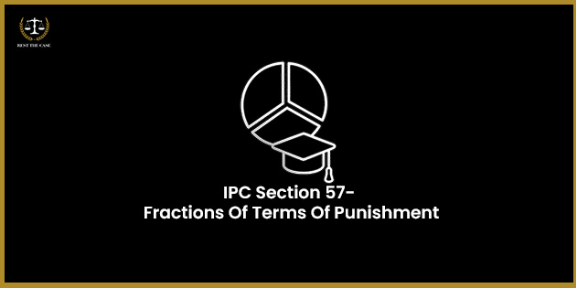IPC
IPC Section 57- Fractions Of Terms Of Punishment

In criminal law, precision is crucial, especially when it comes to calculating the duration of a sentence. One such provision under the Indian Penal Code (IPC) is Section 57, which deals with how to interpret fractions of long-term punishments, particularly in cases of life imprisonment.
While it may seem like a technical rule, IPC Section 57 plays an important role in sentence calculation, remission, parole eligibility, and assessing whether a convict qualifies for leniency under special laws. It does not reduce or alter the sentence itself but provides a legal way to quantify indefinite punishments for administrative or statutory purposes.
What We’ll Explore in This Blog:
- The legal definition and simplified meaning of IPC Section 57
- Why fractional computation of punishment is necessary
- How Section 57 applies to life imprisonment and related sentences
- Use of Section 57 in parole, remission, and eligibility checks
- Status of IPC 57 under the Bharatiya Nyaya Sanhita (BNS), 2023
- Judicial interpretation and examples
What Is IPC Section 57?
Legal Text:
"In calculating fractions of terms of punishment, imprisonment for life shall be reckoned as equivalent to imprisonment for twenty years."
Simplified Explanation:
Section 57 does not mean that life imprisonment is limited to 20 years. It only provides that for calculating fractions of a sentence, such as one-third or one-half, life imprisonment shall be treated as 20 years. For instance, if a parole rule requires serving one-third of the sentence, then one-third of 20 years (i.e., 6 years and 8 months) may be treated as the threshold for a convict serving a life term.
Why Does Fractional Computation Matter?
Many criminal laws and prison rules use terms like:
- After serving one-half of the sentence
- Eligible for remission after 14 years
- Disqualified if the sentence exceeds 7 years
To apply such rules, courts and jail authorities need a fixed number to represent life imprisonment. IPC Section 57 solves this by giving a standard value of 20 years for administrative calculations.
Important Clarification:
This section does not impose a life sentence. Legally, life imprisonment means imprisonment for the remainder of the convict’s natural life, unless the sentence is commuted or remitted by the government or through constitutional powers.
Judicial Interpretation
Indian courts have explained the limited scope of Section 57 in several cases.
- Gopal Vinayak Godse v. State of Maharashtra (AIR 1961 SC 600):
In the case of Gopal Vinayak Godse v. State of Maharashtra (AIR 1961 SC 600) Supreme Court held that life imprisonment means the entire lifetime of the convict. Section 57 is only used when laws or rules require calculating a fraction of the punishment. - Ashok Kumar @ Golu v. Union of India (2021):
In the case of Ashok Kumar @ Golu v. Union of India (2021), the Delhi High Court clarified that Section 57 does not change the nature of a life sentence but helps calculate eligibility for parole or remission benefits.
Where Is Section 57 Used?
- Parole and Furlough: Some prison rules permit parole after serving a portion of the sentence. For life convicts, Section 57 provides the base value for such calculation.
- Remission Schemes: States often provide sentence remissions. The length of time served is measured using this provision to apply the appropriate fraction.
- Statutory Disqualifications: For instance, election laws disqualify individuals sentenced to more than two years. Where needed, Section 57 helps define the comparative measure for life imprisonment.
Status Under BNS, 2023
Under the Bharatiya Nyaya Sanhita, 2023, which replaces the IPC, the substance of IPC Section 57 has been retained under Section 6.
Text of BNS Section 6:
"To calculate fractions of terms of punishment, imprisonment for life shall be reckoned as equivalent to imprisonment for twenty years."
This shows the continued relevance of the provision in India’s reformed criminal code.
Why It Still Matters
Although procedural, IPC Section 57 is matters for:
- Assists in the consistent and fair application of laws relating to sentence benefits
- Ensures that indefinite punishments like life imprisonment are computable in practice
- Prevents misuse or arbitrary interpretation by jail authorities or courts
- Aligns with the principles of the rule of law and uniformity in sentencing
Its continued presence in the BNS highlights its importance in maintaining legal clarity in sentencing matters.
Conclusion
IPC Section 57 serves a key purpose in calculating fractions of life sentences for legal and administrative purposes. It does not alter the definition of life imprisonment, which still means imprisonment for the entire life of the convict. Instead, it provides a uniform standard for applying rules where partial completion of a sentence must be measured. This provision remains essential for parole, remission, and statutory eligibility. Its retention in the Bharatiya Nyaya Sanhita confirms its continued relevance in India's criminal justice system.
Frequently Asked Questions
Q1. What is IPC Section 57?
It allows life imprisonment to be treated as 20 years when calculating fractions of a sentence, such as for parole or remission.
Q2. Does it reduce a life sentence to 20 years?
No, life imprisonment still means imprisonment for the convict’s entire life. Section 57 only assists with administrative calculations.
Q3. When is Section 57 applied?
It is used when any law or rule requires calculating a portion of a sentence, such as one-third or one-half, especially for life convicts.
Q4. Is Section 57 included in the new Bharatiya Nyaya Sanhita?
Yes, it has been carried over as Section 6 of the BNS 2023, with the same wording and purpose.
Q5. Has the Supreme Court interpreted this provision?
Yes, in Godse’s case, the Court held that life imprisonment is for the full natural life of the convict and that Section 57 is only for limited use in sentence-related calculations.






